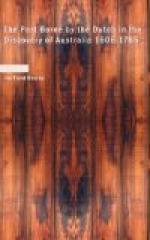When you shall have come upon the South-land in the said latitude or near it, you will skirt the coast of the same as far as Latitude 50 deg., in case the land should extend so far southward; but if the land should fall off before you have reached the said latitude, and should be found to trend eastward, you will follow its eastern extension for some time, and finding no further extension to southward, you will not proceed farther east, but turn back. You will do the same if you should find the land to turn to westward. In returning you will run along the coast as far as it extends to northward, next proceeding on an eastern course or in such wise as you shall find the land to extend: in which manner you will follow the coast as close inshore and as long as you shall find practicable, and as you deem your victuals and provisions to be sufficient for the return-voyage, even if in so doing you should sail round the whole land and emerge to southward.
The main object for which you are dispatched on this occasion, is, that from 45 or 50 degrees, or from the farthest point to which the land shall be found to extend southward within these latitudes, up to the northernmost extremity of the South-land, you will have to discover and survey all capes, forelands, bights, lands, islands, rocks, reefs, sandbanks, depths, shallows, roads, winds, currents and all that appertains to the same, so as to be able to map out and duly mark everything in its true latitude, longitude, bearings and conformation. You will moreover go ashore in various places and diligently examine the coast in order to ascertain whether or no it is inhabited, the nature of the land and the people, their towns and inhabited villages, the divisions of their kingdoms, their religion and policy, their wars, their rivers, the shape of their vessels, their fisheries, commodities and manufactures, but specially to inform yourselves what minerals, such as gold, silver, tin, iron, lead, and copper, what precious stones, pearls, vegetables, animals and fruits, these lands yield and produce.
{Page 20}
To all which particulars and whatever else may be worth noting, you will pay diligent attention, keeping a careful record or daily journal of the same, that we may get full information of all your doings and experiences, and the Company obtain due and perfect knowledge of the situation and natural features of these regions, in return for the heavy expenses to which she is put by this expedition.
To all the places which you shall touch at, you will give appropriate names such as in each instance the case shall seem to require, choosing for the same either the names of the United Provinces or of the towns situated therein, or any other appellations that you may deem fitting and worthy. Of all which places, lands and islands, the commander and officers of these yachts, by order and pursuant to the commission of the Worshipful Governor-General




